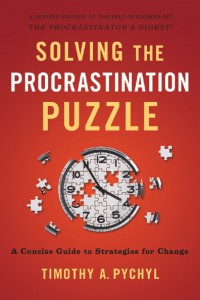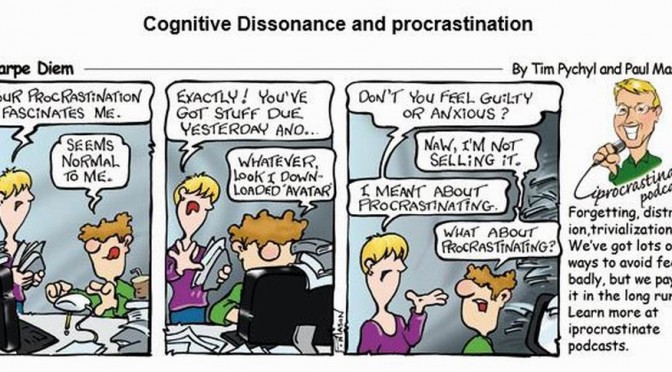 Real solutions for Procrastination from Dr. Timothy A. Pychyl, part 1
Real solutions for Procrastination from Dr. Timothy A. Pychyl, part 1
Student Success Podcast No. 13, Jan. 15, 2014
Today’s Guest: Timothy A. Pychyl, Ph.D.
Dr. Pychyl shares his incredible knowledge, experience, research, and insight into the nature of procrastination and how to overcome it. Dedicated to bettering people’s lives, he uniquely applies academic concepts in a way we can all understand and appreciate.
This is part 1 of 2 segments we are publishing on the Student Success Podcast. Tim has also published his own version of the interview on his “iProcrastinate” podcast.
Please see more from Dr. Pychyl at the Resources links below.
 Subscribe to Student Success Podcast RSS
Subscribe to Student Success Podcast RSS
or find us on iTunes
Guest Biography
Dr. Timothy A. Pychyl is Director, Centre for Initiatives in Education & Associate Professor, Department of Psychology, Carleton University, Ottawa. Applying his expertise in Psychology and his deep desire to help people, Dr. Pychyl teaches, writes, blogs, podcasts, and runs conferences on procrastination. Dr. Pychyl gladly shares with readers his own experiences as a parent and person who struggles, like us all, to get things done. Well, he does more than most of us, including to keep a team of sled dogs, but even he has to force himself to get things done sometimes.
Topics Discussed
- See below for detailed bulleting of this conversation
Resources
- Don’t Delay blog from Psychology Today
- The Procrastination Research Group from Carleton University
Easy to remember url: http://procrastination.ca/ - About page from the Research Group for Dr. Pychyl, including links to his “mushing” (sled dogs) and his life as “Mr. Mom.”
- Carpe Diem cartoon on Procrastination
- Solving the Procrastination Puzzle book by Timothy A. Pychl (Amazon.com link)
- Wall Street Journal article featuring Dr. Pychyl: To Stop Procrastinating, Look to Science of Mood Repair
- iProcrastinate podcast
- iProcrastinate podcast episode of this interview
- Dr. Pychyl’s Teaching Philosophy
Credits
Host: Michael L. Bromley
Original Music by Christopher Bromley (copyright 2011, 2013)
Background snoring: by Stella
Best Dogs Ever: by Puck, Stella, & Artemis:

Here for Puck & Stella slideshow
- Bromley:
- Personality differences: wife and he fight over putting up the Xmas lights and then don’t want to take them down when she just wants to put them away
- Tim:
- Wife and he also different from each other, she’s laid back
- But important not to label people because not procrastinating does not make you an uptight person
- Bromley discusses background and A+ Club origins
- Worked to build relevancy in history for students
- Realized so many students not able to fit into expectations of high school
- Worked on relevancy with students
- Wanted to help kids in more positive ways: to do what kids who do well do, especially Executive Function issues.
- Carleton Univ program: Centre for Initiatives in Education
- = a 2nd chance for kids who underperformed in high school
- They support them in college
- Has had students move into PhDs and law school
- Slow starters, had things going on, has given them opportunity.
- Bromley speech to National Honors Society students
- Called them “grade whores” — oops!
- But point was you are in NHS because you do the things you need to do to get good grades
- But that doesn’t make you the smartest person in the room
- Other kids not here need to use your strategies, to be grade whores
- Tim:
- Irony: if you forget about the grades and just do the learning, often the grades will follow.
- But if always focused on grades, it can create anxiety, and it can cripple performance in some ways
- Tim on relevancy:
- Likes the idea of showing kids relevancy
- This = value and expectancy
- Do you expect to succeed?
- What skills do you need to achieve?
- Bromley:
- The idea is for kids to find relevancy on their own.
- Different teachers connect with different kids, but kids don’t always find relevancy in all their classes
- A+ Club works on relevancy and purpose
- High school = a very structured day; students lose control of the day because the bells define it for them.
- Found that if students articulate responsibilities after school, they performed better.
- Awareness and Articulation: creates conditions for better choices
- The idea is for kids to find relevancy on their own.
- Tim:
- Awareness = metacognitive skill that needs to be taught
- Once developed, things happen so much better, especially for kids with attentional difficulties
- Bromley:
- We raise awareness and help set goals
- But.. we can lead kids to water, but can’t make them drink
- How can we do that?
- Tim:
- Have to orchestrate all the variables
- Show students the value, the skills to keep responsibilities front and center in their minds, such as “this is due tomorrow”
- Move to goal intention and then to implementation intention: “when are you going to do that?”
- Know what you need to do, then move to doing it
- implementation intentions = in situation X I will do behavior Y
- = next step, next skill: know what I need to do (goal intention), and now to implementation intention, which “what I am going to do and when”
- = concrete for two outcome:
- 1st: have created a decision that puts the stimulus for action into the environment: so I don’t have to think too much — when the situation happens, it helps me recall that I’m going to do this now
- 2nd: it becomes very concrete:
- Concrete thoughts add to the present, to urgency
- Abstract thoughts are disassociated with the present, belongs to the future, no sense of urgenc
- Pre-decision + concrete thought = urgency to get it done
- Behavioral economists:
- Recognize that we like quick rewards
- But that rewards too far in the future are discounted;
- They understand motivations
- But they doesn’t create solutions for procrastination
- Deal with delay as predictably rational
- But procrastination is emotional
- Tim’s 6 year old: replies to cleaning room with “I don’t feel like it”
- That’s where we can focus on finding solutions
- Have to orchestrate all the variables
- Bromley on tutoring
- contains learning, but seeing it now is an implementation intention
- Tim:
- Tutoring becomes a clear predecision >> will meet with a tutor
- Then introduces externalities, accountability
- Some people need it
- Scaffolds the situation by providing external structure, external accountability, a push to get it done b/c on my own I can’t get it done.
- All these things have to dance together; no one magic bullet
- Tutoring:
- Some kids it will be the only time they actually do anything
- Need to remove the scaffolding
- Tutoring can build confidence
- He has a deep faith in students: and we can develop a faith in themselves
- Learning to telemark ski: a friend led him through it… needed that direct assistance = “zone of proximal development”
- Gave him a sense of success
- Failure over and over again leads to wanting to quit
- Tutoring can lead to dependency, but when done well it can be a gift of teaching
Bromley: we incorporate a reflection process into our tutoring
- help kids be honest with themselves
- how do we convert those conversations into active solutions?
- “Giving in to feel good” >> not rewarding myself for doing nothing
- Tim:
- The practice of helping people to be honest with themselves is great place to star
- All procrastination is self-deception
- Stanford prof wrote of structured procrastinators: “avoidance motivation”
- It might work, but it still involves self-deception
- When we predict our future, we rely on our present
- Example: difference between grocery shopping hungry or just after eating = different experiences
- Relying on present state to predict the future
- With procrastination, when we put off a task we want to avoid, it makes us feel better, feel relief
- Quite irrationally, then, we think that tomorrow we will feel different than today
- Self-honesty is brutally important: to recognize that I’m not going to feel more like it tomorrow, I don’t actually work better under pressure, and I’ll only do it tomorrow because my back is against the wall, or I say I work better under pressure because I only work under pressure
- When we start to be honest, then will realize that I am giving in to feel good and that it does have consequences
- Seeing it for what it is: emotion focused coping, avoidance
- By being honest with ourselves, we can motivate to change
- Likes in A+ Club program that helps studnets learn concrete skllls around exectuvie function to take more ownership of their lives, to be more accountable to themselves
- Bromley:
- So happy to have learned about Tim’s work
- Have already started talking to our students about these ideas
- Just talking to them about “giving in to feel good” = a very specific thing
- Bromley’s evolving view of procrastination>> seeing it now as not a positive thing, period.
- Tim: “Full stop.” Lol
- The difference between rational delay or prioritization and procrastination
- Kids understand this idea of “giving in to feel good”
- Also using Tim’s ideas on self-forgiveness
- Described a student in the program who didn’t know anything about a test
- Asked her to project into the future how she will feel about the test if she doesn’t study tonight
- Helped her to realize more about her choices and emotions, coming down hard on herself
- Tim:
- Sleep is a strong avoidance strategy, an emotion-focused coping strategy, others… eating, shopping, drugs, alcahol
- = mood repair, and procrastination is just another one
- These are basic life skills>> how is it that I am coping with this stress? then make a plan that doesn’t lead to negative outcomes
- He reaches out to people who use “time travel” and it has worked for them
- “Just get started”
- Don’t feel like it, or anxiety: easier to escape it
- But recognizing that life comes with stress, we can better face it
- So let’s just get started
- Progress on a goal fuels well-being
- And realizing it, creates an upward spiral: okay that worked, I’ll try a little more…
- We have to find a low-threshold of engagement: just starting
- Bromley:
- This worked with this student who couldn’t even say what would be on a test tomorrow
- Well, where could you start? What’s your plan?
- “Go to sleep”
- Wow. But here’s where we can implement projecting into the future. Tomorrow, will you feel better or worse about having just gone to sleep tonight?
- She opened up, talked about coming down hard on herself and not forgiving herself.
- Tim:
- And being able to try again, and changing the motivation to approach rather than avoidance.
- Sleep is an avoidance strategy, a reaction to stress, a coping strategy.
- Eating, retail therapy, alcohol… and procrastination
- It’s all mood repair
- Important conversation: teaching life skills, looking at yourself
- What’s a different plan to take?
- Do Time travel to realize cost of choices
- His listeners and readers contributed their stories to the WSJ article, especially on time travel.
- Tim:
- My no. 1 mantra; Just get started. Not “Just do it” — that’s overwhelming.
- Do one of the problems, or just get my books out
- “Don’t feel like it” or anxiety
- Would be easier to escape
- But you have to realize that life comes with stress and that progress on a goal fuels well-being
- Have to find the low-threshold of engagemen
- Bromley:
- Worked with the studentwho couldn’t describe the test: “
- Where could you start?
- She decided that she can open up her notes to at least review what the teacher said in class.
- Hopefully she followed on this intention. At least she’s aware that there is a process she can follow.
- Can we say “doing it to feel good”
- Tim:
- Making a little steps
- It’s tough sometimes because we expect too much of ourselves, so the question becomes, it wasn’t exactly what she hoped for, or you didn’t get an A, or you did more poorly than you hoped
- But what did you do differently?
- Here is the dance between will and skill and helping develop metacognitive skills
- Tutors can help at the level of attributions,
- Things like, oh, I was lucky, or it doesn’t matter, or I’m stupid
- So there are other ways to make attributions
- Many layers for people struggling with task delay as an avoidance strategy and for tutors to help look at value and expectancy, and what kind of attributions people are making
- Group of things we can help to develop as metacognitive skills
- So the student may not have done that well, and she has a whole script she is used to saying, quite negative
- May need to retrain those attribution
- Bromley:
- Taught 8 years, and never heard any of this
- All I heard was “do your work”
- The moral judgments placed on kids are horrid
- Tim:
- Have to remember the developmental process
- In early development, a –
- We’d recognize different development
- A+ Club focus on executive function is well-placed because it is pre-frontal cortex, which is the last part of the brain to mature
- We all have varied development
- He taught grade 7/8, and some look like grade 4, others grade 12
- We all have different physical, cognitive and social development
- That cognitive development is reflected in our executive function,
- Some high school kids will look and act like adults, but their cognitive development is lagging behind and it may be due to executive function, and they need help in that area
- We need to recognize that and give it
- Tutoring may not always be an enabler
Pt 2 to be published Jan 22.
